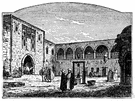caravansary
(redirected from caravansaries)Also found in: Thesaurus, Encyclopedia.
car·a·van·sa·ry
(kăr′ə-văn′sə-rē) also car·a·van·se·rai (-rī′)n. pl. car·a·van·sa·ries also car·a·van·se·rais
1. An inn built around a large court for accommodating caravans along trade routes in central and western Asia.
2. A large inn or hostelry. In both senses also called serai.
[French caravanserai, from Persian kārvānsarāy : kārvān, caravan + sarāy, camp, palace; see terə- in Indo-European roots.]
American Heritage® Dictionary of the English Language, Fifth Edition. Copyright © 2016 by Houghton Mifflin Harcourt Publishing Company. Published by Houghton Mifflin Harcourt Publishing Company. All rights reserved.
car•a•van•sa•ry
(ˌkær əˈvæn sə ri)also car•a•van•se•rai
(-səˌraɪ, -ˌreɪ)n., pl. -sa•ries also -se•rais.
1. (in the Near East) an inn, usu. with a large courtyard, for the overnight accommodation of caravans.
2. any large inn or hotel.
[1590–1600; < French < Persian kārwānsarāy=kārwān caravan + sarāy mansion, inn]
Random House Kernerman Webster's College Dictionary, © 2010 K Dictionaries Ltd. Copyright 2005, 1997, 1991 by Random House, Inc. All rights reserved.
ThesaurusAntonymsRelated WordsSynonymsLegend:
Switch to new thesaurus
| Noun | 1. |  caravansary - an inn in some eastern countries with a large courtyard that provides accommodation for caravans caravansary - an inn in some eastern countries with a large courtyard that provides accommodation for caravans |
Based on WordNet 3.0, Farlex clipart collection. © 2003-2012 Princeton University, Farlex Inc.
Translations